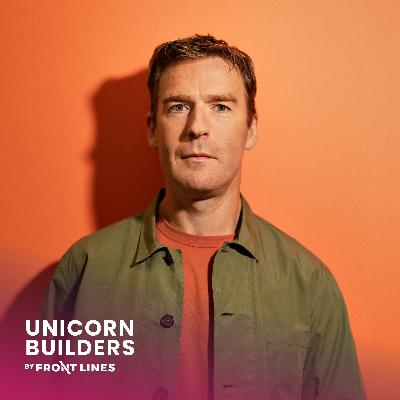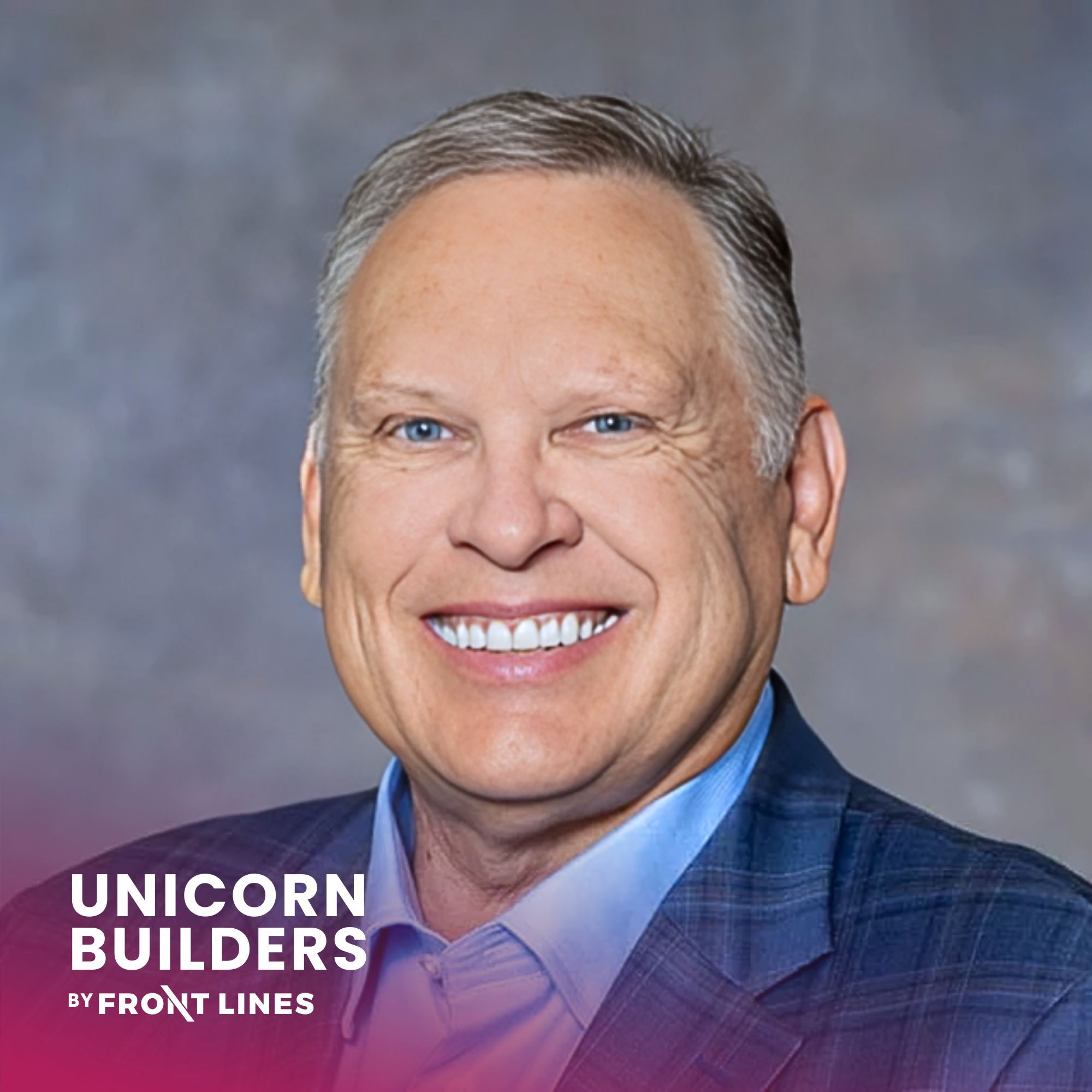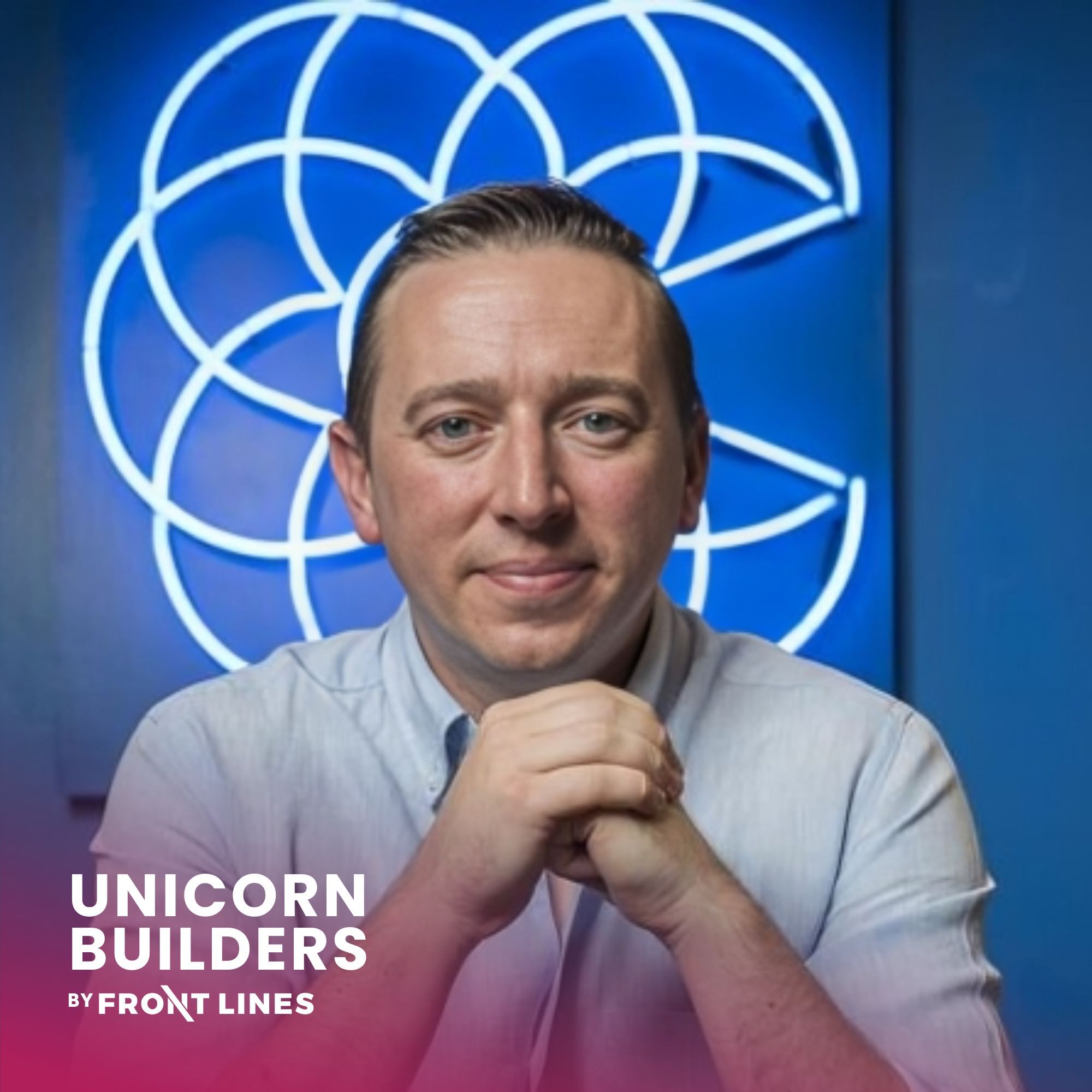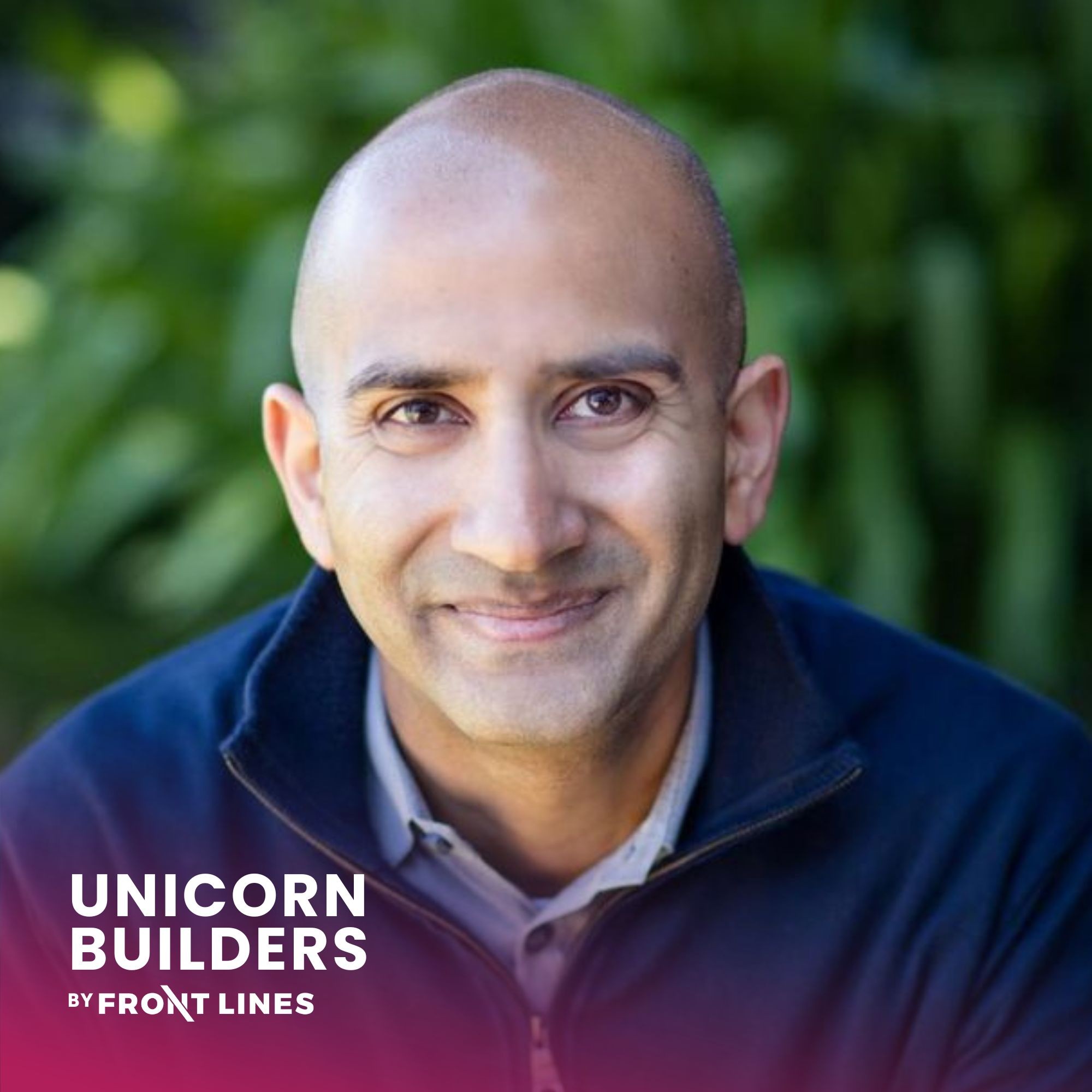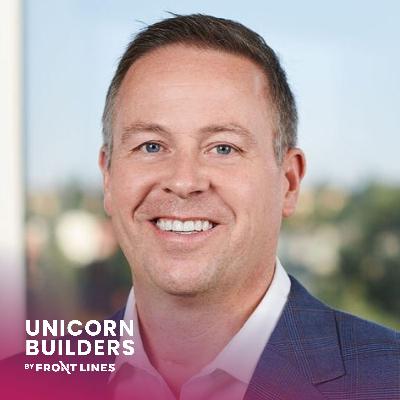Discover Unicorn Builders
Unicorn Builders

69 Episodes
Reverse
Intercom is a pioneer in customer communication platforms, with $241 million in funding and serving thousands of customers worldwide. After 15 years of building horizontal messaging tools, the company made a dramatic strategic pivot in 2022 to focus entirely on AI-powered customer support. In this recent episode of Unicorn Builders, we sat down with Des Traynor, Co-Founder of Intercom, to learn about their remarkable transformation from a sprawling communication platform to an AI-first customer service leader—and how they shipped their first AI features just four weeks after ChatGPT's launch.
Topics Discussed:
Intercom's "five alarm fire" moment when ChatGPT launched and the immediate roadmap pivot
The painful but necessary decision to abandon multiple product lines and focus solely on customer service
How they developed outcome-based pricing for AI agents (charging per resolution vs. per seat)
The technical complexity behind building production-ready AI support tools beyond "thin wrappers"
Strategic lessons from the early competition with Drift and category positioning challenges
Why most B2B companies are reacting too slowly and superficially to the AI transformation
Building a sustainable company culture that retains talent for 15+ years
GTM Lessons For B2B Founders:
React with appropriate urgency to existential technology shifts: When ChatGPT launched, Des and the team immediately recognized it could eliminate their entire category. Within days, they "ripped up the roadmap" and went "hard on it." Four weeks later, they shipped their first AI features, and eight weeks later launched Fin, their AI agent. Des emphasizes this wasn't heroic—it was survival: "I don't know if I'm going to survive over here, but I'm not going to survive back there." B2B founders facing similar disruption should move with maximum speed rather than hoping for gradual adoption timelines.
Choose painful focus over comfortable sprawl: Intercom's decision to abandon their marketing and sales tools to focus solely on customer service was existentially difficult but critically necessary. Des explains they were "trying to bring too much software to market" and facing the challenge that enterprise buyers couldn't figure out who to talk to about their horizontal platform. The focus decision came from identifying where they had "the clearest right to win"—customer service had their happiest, stickiest revenue and most differentiated product. B2B founders should ruthlessly evaluate where they have the strongest competitive position rather than trying to serve every adjacent market.
Align pricing models with value delivery in AI transitions: Intercom moved from seat-based pricing to outcome-based pricing, charging roughly $1 per resolution. This required confidence that their AI actually works—Des notes "you should only charge for outcomes if you're definitely delivering outcomes." The pricing works because some customers find it "10x to 20x cheaper" than their current approach, while others struggle with the cost depending on their customer value. B2B founders implementing AI should consider how pricing models need to evolve to reflect the actual value delivered rather than traditional input-based metrics.
Embrace the innovator's dilemma decisively: Des argues most B2B companies are responding to AI with "delay" or "dilution"—either waiting another quarter or making meaningless changes. He advocates for completely reimagining products "from a blank page, as if it's 2025 and AI is here." The book he's writing addresses this challenge: companies must choose between building the product that kills them or dying of natural causes. B2B founders shouldn't hedge—they should assume AI capabilities will advance rapidly and rebuild accordingly rather than making incremental adjustments.
Build authentic thought leadership around your expertise: Intercom's marketing strategy centered on genuine knowledge sharing rather than typical B2B lead generation tactics. Des explains they wrote "everything that was true and stuff that we genuinely believed" about running B2B SaaS products, creating real value for their target market. Their current AI content follows the same approach—sharing practical insights about AI implementation rather than hype. B2B founders should focus on contributing genuinely valuable knowledge to their industry rather than optimizing for short-term lead capture.
//
Sponsors:
Front Lines — We help B2B tech companies launch, manage, and grow podcasts that drive demand, awareness, and thought leadership.
www.FrontLines.io
The Global Talent Co. — We help tech startups find, vet, hire, pay, and retain amazing marketing talent that costs 50-70% less than the US & Europe.
www.GlobalTalent.co
Huntress has transformed from a scrappy startup to a cybersecurity powerhouse, approaching $200M ARR while protecting over 175,000 businesses. In this return appearance on Unicorn Builders, Kyle Hanslovan, CEO & Co-Founder of Huntress, shares the brutal realities of scaling from 200 to 550 employees, the costly mistakes that nearly derailed their growth, and the unconventional strategies that built their partner-first empire. Having crossed the centaur milestone ($100M ARR), Kyle reveals why revenue matters more than valuations and how defending company culture becomes the hardest challenge at scale.
Topics Discussed:
The challenges of scaling from 200 to 550 employees while defending company culture
Huntress's biggest strategic mistake: failing to communicate their ability to serve larger companies
The evolution from "security for the 99%" to "cybersecurity for all businesses, not just the 1%"
Why Kyle prioritizes revenue milestones over valuations and unicorn status
The decision to remain partner-first rather than going direct to customers
Building multi-tenancy and "what have I done for you lately" reporting from day one
The harsh reality of "stepping over corpses" as companies scale rapidly
Maintaining the "send it" culture while growing 10x in size
Why Kyle might not start the company again despite $2B valuation
GTM Lessons For B2B Founders:
Embed yourself in your partners' operations: Kyle spent one day per week working inside early MSP partners' offices, learning their operations firsthand. This wasn't about reading case studies or hiring consultants—it was about feeling their pain directly. This approach gave him a decade-long competitive advantage in understanding how channel partners actually work. B2B founders should consider similar embedding strategies with their most important customers or partners to gain deep operational insights.
Solve the financial equation, not just the technical problem: The pivotal moment came when partner Toby asked Kyle, "How do I buy your product and still afford a boat?" This forced Kyle to understand that partners need to make money, not just deliver value. He learned to articulate exactly how Huntress reduced cost of goods sold, improved talent retention, and created 50% margins for partners. B2B founders must understand their partners' or customers' complete financial picture and show how their solution improves profitability.
Build for multi-tenancy from day one: Kyle discovered that partners need to segment customers with individual dashboards, role-based access, and custom reporting. Bolting on multi-tenancy later creates crushing technical debt that can force architecture rebuilds. B2B founders building channel-based solutions must architect for multi-tenancy from the beginning, regardless of how simple their initial product seems.
Communicate your evolution or risk being trapped by early positioning: Huntress's biggest mistake was building capability to serve 10,000+ employee companies while still being perceived as only serving 50-person companies. This positioning hurt valuations, deal wins, and prevented prospects from seeing themselves in Huntress's mission. B2B founders must actively communicate their expanding capabilities and market position as they grow, not assume the market will figure it out.
Hire people better than you or prepare to be replaced: Kyle's most direct advice to founders is that rapid growth requires constantly "stepping over corpses" of good people who can't scale fast enough. He warns new executives that they must work both "in" and "on" the business simultaneously, or risk being replaced every 18-24 months. B2B founders should set clear expectations about growth pace and hire people who are already ahead of the company's current needs.
Maintain speed as a cultural imperative: Kyle's "send it" philosophy isn't just about moving fast—it's about maintaining the ability to prioritize customer emergencies over process. He argues that losing this speed is symptomatic of deeper cultural rot including too much bureaucracy and mission drift. B2B founders must evangelize speed and directness throughout their organization, especially as they add layers of management.
//
Sponsors:
Front Lines — We help B2B tech companies launch, manage, and grow podcasts that drive demand, awareness, and thought leadership.
www.FrontLines.io
The Global Talent Co. — We help tech startups find, vet, hire, pay, and retain amazing marketing talent that costs 50-70% less than the US & Europe.
www.GlobalTalent.co
Upgrade is revolutionizing consumer financial services through their multi-product platform that helps customers improve their credit while saving money. With over 7 million customers, Upgrade has scaled rapidly since its founding in 2017. In this episode of Unicorn Builders, we sat down with Renaud Laplanche, Co-founder and CEO of Upgrade, to discuss how he built his second fintech unicorn after pioneering the industry with Lending Club, and how he applied critical lessons from his first venture to create a more sustainable, diversified business model.
Topics Discussed:
The rapid scaling of Upgrade from launch to $1 billion in loan volume in less than a year
Creating a multi-product fintech ecosystem rather than a single-product company
How Upgrade's modular technology architecture enables rapid product development
The advantages of a multi-channel customer acquisition strategy
Building complementary products that work together to solve customer financial needs
Strategic acquisition of Uplift to strengthen Buy Now, Pay Later capabilities
How Upgrade balances revenue streams to remain resilient through different economic conditions
GTM Lessons For B2B Founders:
Design your architecture for product expansion: Renaud built Upgrade's technology with a modular, componentized architecture of microservices that could be rearranged for different products. This allowed them to reuse 70% of their codebase when launching their second product, dramatically accelerating time-to-market for new offerings.
Create complementary product sequences: Upgrade deliberately sequenced their product launches to create natural cross-selling opportunities. Their personal loans (which consolidate existing credit card debt) pair perfectly with their credit card (which handles future spending more responsibly). Think about how your initial products can lead customers to need your next offerings.
Leverage low-CAC entry points: Upgrade acquires 75% of new users through their Buy Now, Pay Later partnerships at virtually no customer acquisition cost, then cross-sells higher-margin products. As Renaud explains, "BNPL is only 20% of our revenue, but 75% of our user acquisitions." Find your own low-friction entry points that can feed your higher-margin business lines.
Build resilience through diversification: Upgrade created a balanced portfolio of products that perform differently across economic cycles. Their unsecured lending thrives when the economy is strong, while secured loans provide stability during downturns. This diversification allows them to "lean on different products depending on the environment."
Optimize the second time around: When building Upgrade after Lending Club, Renaud focused on recurring revenue and customer relationships: "At Lending Club, we had mostly one product with revenue that was very front-loaded. Every quarter you had to go out and earn revenue. Upgrade is entirely different—it's a lot of recurring revenue." Design your business model to create predictable, sustainable growth rather than constantly chasing new customers.
//
Sponsors:
Front Lines — We help B2B tech companies launch, manage, and grow podcasts that drive demand, awareness, and thought leadership.
www.FrontLines.io
The Global Talent Co. — We help tech startups find, vet, hire, pay, and retain amazing marketing talent that costs 50-70% less than the US & Europe.
www.GlobalTalent.co
NinjaOne has emerged as a dominant force in IT endpoint management, recently raising $500 million and positioning itself to become one of the largest IT software companies globally. The company serves two distinct buyer personas: internal IT departments at companies with 100-100,000 endpoints, and managed service providers (MSPs) who act as outsourced IT departments for SMBs. In this episode of Unicorn Builders, CEO and Co-Founder Sal Sferlazza shares how NinjaOne entered a "hyper-saturated" market with 11-12 entrenched competitors and built a next-generation platform that customers actually want to use.
Topics Discussed:
NinjaOne's strategy of entering a saturated market with next-generation cloud-first technology
The company's dual buyer persona approach serving both internal IT and MSPs
Sal's decision to throttle growth early to build product stability and customer trust
The minimal marketing approach that relied primarily on outbound sales until recently
Maintaining engineering agility through a single, homogeneous technology stack
The recent acquisition of Dros and approach to strategic M&A
Building unlimited TAM through product interplay rather than individual product innovation
Founder-led culture and the importance of staying connected to customers
GTM Lessons For B2B Founders:
Follow customer signals even when they contradict your initial strategy: Sal discovered NinjaOne's second major buyer persona (internal IT departments) completely by accident when large companies started calling inbound despite zero messaging targeting them. "Once we turn on paid advertising early in our journey, we started getting very large internal IT departments calling inbound when none of our messaging or branding was geared towards those departments." B2B founders should remain agile enough to pursue unexpected market signals that demonstrate genuine product-market fit.
Throttle growth to build long-term competitive advantages: Despite having the ability to grow faster, Sal deliberately slowed growth in the early years to ensure product stability and exceptional customer support. "You know, it takes years to build trust with customers and a day to lose it... I think we took a thoughtful approach and we wanted to build a reputation for an exceptional product and unbelievable support." This contrarian approach to Silicon Valley's "growth at all costs" mentality allowed NinjaOne to build sustainable competitive moats.
Maintain technical agility through architectural discipline: NinjaOne's competitive advantage stems from having all products built on a single, modern technology stack. "All of your engineering and product development efforts are on a single stack, a newer stack, and all coded in the same language... we could fabricate a new development team from the ether in like a week because everyone's on a homogeneous stack." B2B founders should resist the temptation to acquire companies or build disparate systems that reduce long-term engineering velocity.
Leverage market timing and secular trends: NinjaOne's success coincided with the perfect storm of distributed workforce, device proliferation, budget constraints, and tool consolidation needs. "We live in a world where there's distributed workforce now... there's a continuous stream of devices... There's wallet consolidation and there's tool consolidation." B2B founders should identify and align their solutions with multiple simultaneous market trends that create compounding demand.
Distinguish between customer needs and wants through data: With unlimited expansion opportunities, Sal emphasizes the critical skill of prioritization. "One of the hardest things is to separate... needs versus wants. There's probably some features requests that have come in that have been asked for eight years, but no customer ever left and no customer did not buy." B2B founders must develop the discipline to build what customers actually need rather than everything they ask for.
//
Sponsors:
Front Lines — We help B2B tech companies launch, manage, and grow podcasts that drive demand, awareness, and thought leadership.
www.FrontLines.io
The Global Talent Co. — We help tech startups find, vet, hire, pay, and retain amazing marketing talent that costs 50-70% less than the US & Europe.
www.GlobalTalent.co
Pilot has transformed how startups and SMBs handle their financial back office operations, combining technology with human expertise to deliver end-to-end accounting and tax services. As a tech-enabled services company serving thousands of businesses, Pilot represents a new category of back office automation that goes beyond traditional software solutions. In this episode of Category Visionaries, I sat down with Waseem Daher, Founder and Executive Chair of Pilot, to explore how the company built a trusted brand in a high-trust industry and scaled through strategic GTM decisions.
Topics Discussed:
Pilot's $400K domain purchase decision and its impact on brand credibility
The evolution from startup-focused to full SMB market expansion
Building a tech-enabled services model in an era obsessed with pure software
Creating highly targeted, industry-specific marketing campaigns
Scaling customer acquisition beyond founder networks through quality and word-of-mouth
The strategic decision to stay in the weeds with customer interactions
GTM Lessons For B2B Founders:
Plan for success with brand investments: Pilot spent $400K of their seed funding on the pilot.com domain, representing about a third of their raised capital. Daher explained their rationale: "You kind of need to plan for success, meaning in the case that the company is doing super well in a decade, you'll be super happy to be owning your brand." For high-trust service businesses, credibility signals like premium domains become essential sales assets. B2B founders should consider that brand investments may not show immediate ROI but compound over time, especially in industries where trust is paramount.
Focus on secondary trust signals for complex purchases: When customers can't easily evaluate service quality, they rely heavily on secondary signals. Daher drew parallels to choosing a doctor: "It's like well, is the office clean? Is it convenient to me, like do they wear a white coat? Do my friends say they're good?" For B2B services that require deep trust, founders should invest in every touchpoint that signals credibility and professionalism, from domain names to office presentation to customer testimonials.
Use the hardest customer segment to build generalized solutions: Pilot deliberately targeted startups first, not because they were the best fit, but because they represented the most challenging version of the problem. Daher noted: "The startup ranges from literally we support people that are like the day after they have incorporated...and we support companies with many hundreds of people with a VP of finance and a controller." By solving for the extremes, they built a platform that could serve any customer in their target market. B2B founders should consider starting with the most demanding segment to stress-test their solution's flexibility.
Create marketing that only you can execute: Pilot's most successful marketing campaigns leveraged their unique position and expertise. Their Delaware franchise tax campaign exemplified this - they identified when scary tax letters would arrive, provided genuinely helpful education, and offered free assistance. Daher emphasized: "The things I like the most are when we have gotten very into the mind of the buyer to ask genuinely, what do they care about and how can we help them?" B2B founders should develop marketing strategies that leverage their unique insights and capabilities rather than generic approaches any competitor could copy.
Stay customer-proximate even as you scale: Despite Pilot's growth, Daher still personally responds to customer emails and participates in sales calls. He sold the first 100+ accounts himself and continues staying close to customers. "I think it is tempting to believe, oh, I just hire the head of sales and I hire the marketing and like they'll just go and figure it out...I think that's a huge mistake." For B2B founders, maintaining direct customer contact prevents developing an outdated understanding of buyer needs and market dynamics as the company grows.
Embrace tech-enabled services over pure software: While the market favored pure software solutions, Pilot chose a hybrid model combining technology with human expertise. Daher explained their reasoning: "I have never, ever talked to a business owner who has said like, gosh, I really want to buy accounting software. It's like, no, just like solve the problem for me." B2B founders should focus on delivering complete solutions rather than tools, even if it means accepting lower margins initially, as customers increasingly value outcomes over features.
//
Sponsors:
Front Lines — We help B2B tech companies launch, manage, and grow podcasts that drive demand, awareness, and thought leadership.
www.FrontLines.io
The Global Talent Co. — We help tech startups find, vet, hire, pay, and retain amazing marketing talent that costs 50-70% less than the US & Europe.
www.GlobalTalent.co
Gusto has taken a radically different approach to B2B software for small businesses. While most companies serving SMBs treat them as a stepping stone to enterprise markets, Gusto has made small businesses their forever home. Founded in 2012 as ZenPayroll, the company now serves over 400,000 customers with a valuation exceeding $9 billion. In this episode of Unicorn Builders, Tomer London, Co-founder and Chief Product Officer of Gusto, reveals the unconventional go-to-market playbook that built one of the most beloved software companies in the SMB space.
Topics Discussed:
Gusto's consumer-first approach to B2B software design and marketing
The evolution from invite-only beta to 300,000+ customers
Building customer obsession through emotional journey mapping
Scaling customer feedback loops from 10 to 2,000+ employees
The strategic decision to stay focused on SMBs instead of moving upmarket
Multi-phase go-to-market strategy from word-of-mouth to paid channels
Brand development focused on personality over positioning
The launch of Gusto Embedded for platform partnerships
Future expansion into compliance automation for small businesses
GTM Lessons For B2B Founders:
Treat SMBs like consumers, not enterprises: Tomer's most important insight was recognizing that small businesses make purchasing decisions more like consumers than enterprises. Instead of deploying traditional B2B tactics like cold calling and enterprise sales processes, Gusto focused on building a product people love, measuring success through NPS, and relying on word-of-mouth growth. This consumer-oriented approach enabled them to scale to hundreds of thousands of customers without heavy reliance on human-driven sales processes.
Map the emotional journey of every user interaction: Gusto institutionalized customer empathy through design critiques that plot the emotional ups and downs of user experiences. They ask: "Where can we make the highs higher and help lift people from emotional lows?" For example, they celebrate moments like getting paid while providing extra support during difficult tasks like layoffs. B2B founders should systematically examine every customer touchpoint and design experiences that acknowledge the human emotions involved in business processes.
Create listening posts throughout your organization: Early on, Gusto's entire team heard every customer support call in their shared workspace. As they scaled to 2,000+ employees, they built systematic "listening posts" - Slack channels that automatically funnel customer feedback from NPS surveys, social media, and in-app interactions to the entire building team. This ensures great ideas come from everywhere and keeps the entire organization connected to customer voices.
Focus relentlessly on where customers are happiest: Rather than trying to serve all SMBs equally, Gusto measured where they had the highest NPS scores, strongest referrals, and most organic growth. They doubled down on these segments and industries for several years until reaching $10 million ARR. B2B founders should resist the temptation to expand too broadly and instead identify their happiest customer segments and go deep with them first.
Phase your go-to-market strategy deliberately: Gusto's GTM evolved through distinct phases: (1) Invite-only with 20-50 design partners focused on product development, (2) Opening the funnel while testing different channels with one person, (3) Going all-in on what worked (PR, content, social media), (4) Adding paid channels years later, and (5) Building strategic partnerships with accountants. Each phase had clear success metrics and graduation criteria before moving to the next.
//
Sponsors:
Front Lines — We help B2B tech companies launch, manage, and grow podcasts that drive demand, awareness, and thought leadership.
www.FrontLines.io
The Global Talent Co. — We help tech startups find, vet, hire, pay, and retain amazing marketing talent that costs 50-70% less than the US & Europe.
www.GlobalTalent.co
Metropolis is transforming the century-old parking industry through AI-powered computer vision technology and an aggressive acquisition strategy. With over $2 billion in funding, the company has become the largest parking operator in the United States, serving over 4,600 locations across 400+ cities and processing millions of transactions daily. In this episode of Unicorn Builders, Alex Israel, Co-Founder & CEO of Metropolis, shares how his team pioneered the "Growth Buyout" (GBO) strategy—using venture capital to acquire profitable old-world businesses and modernize them with cutting-edge technology.
Topics Discussed:
Metropolis's evolution from a four-person garage startup to the largest parking operator in America
The strategic pivot from organic growth to acquiring established parking management companies
How Metropolis took a public company private with $1.6B in Series C funding
The company's expansion beyond parking into drive-throughs, car washes, and gas stations
Building seamless commerce experiences across the mobility ecosystem
The future of Growth Buyouts as a scaling strategy for tech companies
GTM Lessons For B2B Founders:
Pioneer Growth Buyouts when organic GTM hits walls: Alex discovered that traditional B2B sales weren't working with risk-averse real estate owners who wouldn't hand over keys to their $200M developments to a startup. Instead of grinding through years of slow sales cycles, Metropolis used venture capital to acquire profitable parking management companies, instantly gaining access to 500+ locations and 2x-ing their EBITDA. B2B founders facing similar enterprise resistance should consider whether strategic acquisitions can unlock distribution faster than organic growth.
Focus on revenue synergy, not just cost synergy: Alex warns that cost synergy alone isn't a durable growth strategy. Metropolis succeeded because their technology drove incremental revenue for partners—in some cases over 100% revenue increases at individual locations worth millions of dollars. B2B founders pursuing acquisition strategies must identify how their technology creates new value and captures incremental revenue, not just reduces operational costs.
Build for the entire ecosystem, not just point solutions: Rather than staying narrowly focused on parking payments, Alex positioned Metropolis as a seamless commerce platform across the mobility ecosystem. This vision enabled expansion into drive-throughs, car washes, gas stations, and charging stations where the same "pull up and drive away" experience creates value. B2B founders should think beyond their initial use case and design platforms that can scale across adjacent workflows and industries.
Develop "delusional" conviction while staying pragmatic: Alex emphasizes the importance of "strong convictions loosely held"—being able to filter through constant advice and feedback while maintaining belief in your vision. He describes successful entrepreneurs as having the "delusion" that they can succeed where others have failed, combined with the pragmatism to know when to persist versus when to pivot. B2B founders must balance unwavering conviction in their core thesis with tactical flexibility in execution.
Target industries where you can create "irrefutable value": Metropolis focused on consumer obsession—creating remarkable experiences that generated undeniable value for both end users and business partners. This approach made their value proposition so compelling that they became the "first port of call" for major asset owners. B2B founders should prioritize creating experiences so differentiated that customers can't imagine operating without them, rather than competing on features or pricing alone.
//
Sponsors:
Front Lines — We help B2B tech companies launch, manage, and grow podcasts that drive demand, awareness, and thought leadership.
www.FrontLines.io
The Global Talent Co. — We help tech startups find, vet, hire, pay, and retain amazing marketing talent that costs 50-70% less than the US & Europe.
www.GlobalTalent.co
ScienceLogic is transforming IT operations through its innovative AI ops and observability platform. With over $140 million in funding and a 22-year journey, ScienceLogic has evolved from a bootstrapped startup to an industry leader competing successfully against tech giants like IBM, HP, and Broadcom. In a recent episode of Unicorn Builders, we sat down with David Link, CEO and Co-Founder of ScienceLogic, to learn about the company's contrarian approach to product development, its capital-efficient growth strategy, and how it built a partner-led sales model that now drives 75-80% of revenue.
Topics Discussed:
ScienceLogic's origin solving the fragmented IT monitoring landscape
The "opposite day" approach to product differentiation
Evolution from an appliance-based solution to cloud services
Bootstrapping for 7 years before taking institutional funding
Building a partner-first go-to-market strategy
Multiple platform reinventions to stay ahead of technological shifts
The integration of generative AI capabilities
//
Sponsors:
Front Lines — We help B2B tech companies launch, manage, and grow podcasts that drive demand, awareness, and thought leadership.
www.FrontLines.io
The Global Talent Co. — We help tech startups find, vet, hire, pay, and retain amazing marketing talent that costs 50-70% less than the US & Europe.
www.GlobalTalent.co
Density began with a simple problem: wanting to know how busy a coffee shop was before trekking through the snow. Eleven years later, it has evolved into a company measuring human occupancy across some of the world's most valuable real estate. In this episode of Unicorn Builders, Andrew Farah shares Density's journey from a side project to a pioneering force in measuring how space is used. Andrew explains how Density overcame the five critical challenges in people-counting technology—being real-time, accurate, anonymous, low-cost, and self-installable—and how these innovations are now transforming how organizations understand and design their physical spaces.
Topics Discussed:
The origin of Density as a solution to check a coffee shop's busyness
Why existing people-counting technologies failed in real-world applications
The evolution from serving coffee shops to corporate real estate giants
Density's expansion into airport lounges, universities, and government buildings
The five critical requirements for effective people-counting technology
How Density's insights revealed that 40% of commercial real estate goes unused
The impact of the pandemic on office utilization measurement
The monumentally inefficient use of federal buildings (9% peak utilization)
GTM Lessons For B2B Founders:
Compress your sales cycle by building a "sales-ready" product: Andrew referenced Jim Goetz's "Templeton Compression" philosophy, which advocates for products that can close deals in the first meeting. The ideal B2B product should allow prospects to immediately see themselves using it, turning everything after that initial demo into "just paperwork." B2B founders should design products that create those "aha moments" for prospects as quickly as possible.
Design your product to accelerate the sales cycle: Andrew emphasized that "your sales motion is an outflow of the product you build, more so than the team you construct." When Density finally achieved all five critical attributes (real-time, accurate, anonymous, low-cost, and self-installable), it dramatically changed their sales cycle and motion. B2B founders should prioritize features that remove friction from the buying process over those that merely add capability.
Demonstrate real-world problems to prospects with data they can't ignore: Density's most powerful sales moments came from showing customers data they couldn't access elsewhere - like when Linkedin's workplace strategist realized he had no visibility into how their buildings were used despite managing millions in real estate. Effective GTM strategies often involve revealing to prospects what they don't know about their own operations.
Turn side quests into viral marketing opportunities: Density's public visualization of federal building utilization generated 9.7 million impressions in 24 hours after being amplified by Elon Musk. The project began as a "side quest" analyzing public data about government building usage. B2B founders should look for opportunities to repurpose their core expertise into shareable, data-driven content that demonstrates their unique insights.
Find problems hiding massive inefficiencies: Density discovered that 40% of commercial real estate (worth $150 billion) sits vacant but paid for—a problem that existed before the pandemic but wasn't visible to decision-makers. B2B founders should look for high-value problems where crucial data is missing, as solving these visibility gaps can unlock enormous customer value.
//
Sponsors:
Front Lines — We help B2B tech companies launch, manage, and grow podcasts that drive demand, awareness, and thought leadership.
www.FrontLines.io
The Global Talent Co. — We help tech startups find, vet, hire, pay, and retain amazing marketing talent that costs 50-70% less than the US & Europe.
www.GlobalTalent.co
Sean Henry founded Stord at just 18 years old to solve a critical pain point for e-commerce brands: competing with Amazon's logistics capabilities. What began as a network of third-party warehouses has evolved into a comprehensive commerce enablement platform that helps brands deliver Amazon-like customer experiences. In this episode of Centaur Builders, Sean shares how Stord grew from a bootstrapped startup to managing 11 warehouses with over 3 million square feet, serving leading brands like Athletic Greens, Seed Health, Native, Tula, and Fly by Jing.
Topics Discussed:
Starting Stord at 18 years old after a decade of e-commerce experience
Evolving from a third-party warehouse network to a full commerce enablement platform
Building and scaling physical infrastructure alongside sophisticated software
Expanding from B2B retail fulfillment to omnichannel e-commerce
Creating a new category in the commerce infrastructure space
Implementing executive-led sales as a growth driver
Developing a marketing strategy that showcases customer success
GTM Lessons For B2B Founders:
Start with a wedge product, then expand: Stord began by tackling one critical component of the supply chain—warehouse placement—before expanding to a full-stack solution. Sean explains, "Day one, we kind of stepped back and said, what is the most unique element of [Amazon's] operation and their supply chain? And it's how they place inventory across a network close to consumers to mitigate shipping costs and enable fast speeds." B2B founders should identify a specific high-impact problem, solve it exceptionally well, and use it as a platform for broader expansion.
Turn cost centers into value engines: Stord's most effective pitch is showing brands how to transform an inevitable cost (shipping and fulfillment) into a competitive advantage. Sean shared, "Our best sales pitch ever to a brand is, 'You're going to spend 10 to 15% of your revenue on your end-to-end shipping, fulfillment, returns... Let us take that from you and take it from being a fragmented, clunky cost center where you are shipping too slow, spending too much... to a value engine.'" B2B founders should focus on transforming existing, unavoidable expenses into strategic assets rather than creating entirely new cost categories.
Evolve your ICP strategically: Stord initially cast a wide net to gain volume, then narrowed their focus as they scaled. Sean advises, "Let's actually start with a wide aperture... We want to handle anyone who agrees with the problem we're solving and can get volume flowing in our network." For flywheel businesses that depend on scale, B2B founders should consider prioritizing early volume over extreme ICP precision, then refine as they grow.
Commit to executive-led sales: Stord attributes much of their growth to founder and executive involvement in sales. "Every deal at Stord has a named executive sponsor... It doesn't feel the most scalable. But then you step back as a founder and you go, okay, if 50% of my valuation or my business is driven by growth, how much time am I really investing in growth?" B2B founders should institutionalize executive involvement in key deals rather than fully delegating this crucial function too early.
Map and measure customer ROI meticulously: Stord focuses intensely on documenting specific ROI metrics for each customer. Sean cautions, "If we don't have a specific ROI mapped out for them... if we don't know every time we look at them, this is the feature and ROI they're getting the most... we should consider them pre-churn because they will leave." B2B founders should develop robust ROI tracking systems that demonstrate their solution's specific value to each customer.
Omnicell pioneered automation technology in healthcare, transforming from a startup in Randy's house to a publicly traded company worth over $3B. In today's Unicorn Builders episode, Randy shares his journey from identifying a critical need in healthcare while his daughter was in the ICU, to building and scaling a company that has lasted over three decades.
Topics Discussed:
Building and launching a healthcare tech company in the 1990s
Going public during the dot-com crash after three attempts
The evolution from on-premise solutions to cloud-based systems in healthcare
Transitioning from product-focused to solution-based offerings with onsite expertise
The future of autonomous pharmacy and AI integration
Maintaining relevance and growth over a 30-year journey
GTM Lessons For B2B Founders:
Build trust through personal connection and domain expertise: Randy's background in healthcare and industrial engineering, combined with his personal experience in hospitals, helped him build credibility with early customers. He emphasized the importance of personally visiting customers and sharing his story to create trust in a conservative industry.
Find the right milestone that creates value: Randy's team built a working prototype with just $75,000, which immediately attracted VC interest. He notes, "The key in winning in any of these games is get to the right milestone that creates value. It's not the ultimate finished product... but it's a milestone someone can look at and say, 'Wow, this company is going to make an impact.'"
Make complex technology accessible through familiar comparisons: When marketing their solution, Omnicell found success by comparing themselves to established players: "Because we compare it to their story, to our story, that just allowed people to easily understand." While Randy didn't love referencing competitors in his pitch, it helped quickly establish credibility and understanding.
Evolve your service model based on customer outcomes: Omnicell discovered that having their experts onsite led to twice the productivity compared to customer-operated systems. This insight drove their evolution from a pure product company to a solutions provider: "Many of our products today come with experts and people on site to help you get the outcomes you want."
Think in decade-long horizons while executing in three-year cycles: Randy emphasizes the importance of having both short and long-term vision: "If you only think in two to three year increments, you're going to get to the end of one of those nodes and then you'll have nowhere to go. You need to at least have some thesis on what 5 and 10 years looks like."
Embrace constant reinvention: Randy attributes his longevity to continuous personal and professional development: "You really have to reinvent yourself every three years. What's got me to this point isn't going to do for the next three years." He recommends seeking feedback from board members and advisors who will challenge you to improve.
//
Sponsors:
Front Lines — We help B2B tech companies launch, manage, and grow podcasts that drive demand, awareness, and thought leadership.
www.FrontLines.io
The Global Talent Co. — We help tech startups find, vet, hire, pay, and retain amazing marketing talent that costs 50-70% less than the US & Europe.
www.GlobalTalent.co
Coalition has revolutionized the cyber insurance industry by creating an entirely new category called "active insurance." From its founding in 2017, Coalition has grown to become North America's largest cyber insurance provider, surpassing incumbents who had been in the market for over 20 years. In this episode of Category Visionaries, Joshua Motta shares how Coalition transformed from a startup to a $5B+ company by shifting demand away from traditional insurance products and establishing leadership in a new category they created.
Topics Discussed:
The evolution from cyber security as a technology problem to a risk management challenge
Creating and defining the "active insurance" category
Building and scaling distribution through existing insurance broker channels
The role of education and storytelling in category creation
Coalition's expansion beyond cyber insurance to protect digital businesses' intangible assets
International expansion strategy and future growth plans
GTM Lessons For B2B Founders:
Create categories, don't compete for existing demand: Instead of fighting for market share in an existing category, Coalition created a new category of "active insurance." This allowed them to shift the conversation from product comparison to category versus category, where they could define the rules and measures of success.
Focus on education over pure product marketing: Coalition recognized that their core challenge was an education problem - helping businesses understand cyber risks, insurance coverage, and the value of active risk management. This informed their go-to-market strategy across all channels.
Leverage existing distribution channels effectively: Rather than building their own distribution network, Coalition convinced independent insurance brokers to adopt their new category of insurance by demonstrating 10x improvement over traditional products.
Build category awareness through multiple channels: Coalition deployed a comprehensive strategy including webinars, in-person sessions, broker training, marketing materials, website content, and executive storytelling to establish their category.
Ensure your category definition enables growth: When creating a new category, ensure it's either sufficiently broad to accommodate future expansion or intentionally narrow to drive focus. Coalition chose "active insurance" to allow expansion beyond cyber while maintaining their core differentiation.
//
Sponsors:
Front Lines — We help B2B tech companies launch, manage, and grow podcasts that drive demand, awareness, and thought leadership.
www.FrontLines.io
The Global Talent Co. — We help tech startups find, vet, hire, pay, and retain amazing marketing talent that costs 50-70% less than the US & Europe.
www.GlobalTalent.co
Welcome to another episode of Unicorn Builders. In today's episode, we're speaking with Oren Kaniel, CEO & Co-Founder of AppsFlyer, a mobile attribution and marketing analytics platform that has raised over $300 Million in funding.
Here are the most interesting points from our conversation:
Inception of AppsFlyer: Oren shared how his first experience with an iPhone in 2011 led him to realize the potential of mobile technology, sparking the idea behind AppsFlyer.
Early Days and Challenges: He discussed the early challenges of convincing people about the growth potential of mobile, especially in a market still dominated by desktop and Blackberry users.
Focus on Data Privacy: From the beginning, AppsFlyer was built with a strong emphasis on data privacy, which Oren recognized as a critical need for the future of mobile marketing.
Bootstrapping Before Funding: Oren mentioned how the company was bootstrapped for its first few years, which instilled a strong discipline in the team and shaped the company's culture.
Navigating Fundraising: The fundraising journey wasn’t straightforward. Oren shared key insights into how they strategically positioned AppsFlyer to attract significant venture capital investment.
Building a Global Presence: Oren emphasized the importance of thinking globally from day one, highlighting how AppsFlyer expanded its operations to over 20 offices worldwide, ensuring a strong local presence in key markets.
//
Sponsors:
Front Lines — We help B2B tech companies launch, manage, and grow podcasts that drive demand, awareness, and thought leadership.
www.FrontLines.io
The Global Talent Co. — We help tech startups find, vet, hire, pay, and retain amazing marketing talent that costs 50-70% less than the US & Europe.
www.GlobalTalent.co
Welcome to another episode of Unicorn Builders. In today's episode, we're speaking with Satyen Sangani, CEO & Co-Founder of Alation, a data intelligence platform that has raised over $340 Million in funding.
Here are the most interesting points from our conversation:
Category Creation Challenges: Alation’s journey involved building a brand-new category from scratch, which took nearly five years to be recognized. The process was long and required articulating a problem customers didn’t realize they had — data understanding and accessibility.
The Search for Product-Market Fit: Early on, the company focused on user interviews and trials, identifying that customers struggled more with writing SQL queries than data discovery. This discovery led to the development of their first product.
Resisting Temptations to Fit into Existing Categories: Although Satyen considered repositioning Alation under the emerging “data governance” category, the team chose to stick to their vision, focused on enabling data consumption, which paid off in the long run.
Building the Go-to-Market Motion: In the early days, marketing drove 90% of the company’s leads, while sales focused on enterprise deals. This inbound-heavy approach allowed them to grow without significant outbound efforts initially.
The Evolution of Data Intelligence: Alation’s positioning evolved from a data catalog to “data intelligence” as competitors emerged and the need for a broader vision became apparent. This shift helped the company compete at a higher level.
Fundraising as a Storytelling Exercise: Satyen emphasizes the importance of balancing the proof of success with the dream during investor pitches. Storytelling and the articulation of the long-term vision have been key to securing over $340 million in funding.
//
Sponsors:
Front Lines — We help B2B tech companies launch, manage, and grow podcasts that drive demand, awareness, and thought leadership.
www.FrontLines.io
The Global Talent Co. — We help tech startups find, vet, hire, pay, and retain amazing marketing talent that costs 50-70% less than the US & Europe.
www.GlobalTalent.co
Welcome to another episode of Unicorn Builders. In today's episode, we're speaking with Robert Nishihara, Co-Founder of Anyscale, an AI compute platform that has raised over $250 Million in funding.
Here are the most interesting points from our conversation:
Anyscale's Origin Story: The company began as a commercialization effort for Ray, an open-source project tackling AI compute challenges.
AI's Early Days: In 2012, AI was still experimental until deep learning breakthroughs rapidly expanded the field, driving demand for scalable compute solutions.
The ChatGPT Inflection Point: The release of ChatGPT in 2022 turned AI into a top priority for businesses, validating Anyscale’s bets on scalable AI infrastructure.
Scaling AI for Business Impact: Many businesses are still in the experimentation phase of AI, needing rapid iteration and productionization to fully unlock AI’s potential.
AI Flexibility Is Key: Companies seek platforms like Ray that can support diverse AI workloads, from deep learning to generative AI, to future-proof their infrastructure.
Community-Driven Marketing: Anyscale’s marketing strategy revolves around growing its open-source community through events like Ray Summit, converting users into loyal customers.
//
Sponsors:
Front Lines — We help B2B tech companies launch, manage, and grow podcasts that drive demand, awareness, and thought leadership.
www.FrontLines.io
The Global Talent Co. — We help tech startups find, vet, hire, pay, and retain amazing marketing talent that costs 50-70% less than the US & Europe.
www.GlobalTalent.co
Welcome to another episode of Unicorn Builders. In today's episode, we're speaking with Dimitri Sirota, CEO & Co-Founder of BigID, a data security and compliance platform that's raised $350 Million in funding.
Here are the most interesting points from our conversation:
BigID's Origin Story: Dimitri shares how the company was founded during the nascent stages of the internet and how the evolution of browsers like Mozilla sparked early excitement in the tech industry.
Data Privacy as a Market Opportunity: The idea for BigID emerged from identifying a gap in the market for data privacy and compliance, which was becoming increasingly crucial due to regulatory demands.
Securing Major Funding: The company's ability to raise $350 million is tied to its strong value proposition in the data security space and the growing importance of compliance in enterprise environments.
Early Challenges and Growth: Dimitri discusses the challenges faced in the early days of BigID, including convincing companies of the importance of data privacy and navigating the complexities of the regulatory landscape.
Market Expansion and GTM Strategy: The conversation dives into how BigID expanded its market presence, focusing on a global go-to-market strategy that involved strategic partnerships and a strong emphasis on customer success.
Future of Data Security: Dimitri offers insights into the future of data security, highlighting emerging trends in AI and automation that are set to reshape the landscape.
//
Sponsors:
Front Lines — We help B2B tech companies launch, manage, and grow podcasts that drive demand, awareness, and thought leadership.
www.FrontLines.io
The Global Talent Co. — We help tech startups find, vet, hire, pay, and retain amazing marketing talent that costs 50-70% less than the US & Europe.
www.GlobalTalent.co
Welcome to another episode of Unicorn Builders. In today's episode, we're speaking with Doug Winter, CEO & Co-Founder of Seismic, a sales enablement platform that has raised $450 Million in funding.
Here are the most interesting points from our conversation:
Early Vision of Sales Enablement: Doug describes how Seismic identified the gap in content management for sales and marketing, focusing on building a cloud-based solution when the market was still hesitant about the cloud.
Riding Salesforce’s Wave: Seismic leveraged the trust and groundwork laid by Salesforce to gain customer confidence in cloud-based solutions, especially in the early days when skepticism was high.
Category Creation Challenges: Doug highlights the lengthy and patient process of defining and popularizing the sales enablement category, a journey that took over five years to gain widespread industry recognition.
Large Enterprise Focus: From the outset, Seismic targeted large enterprises instead of smaller startups, a strategic decision that shaped their growth trajectory and helped secure substantial deals, including their first million-dollar customer.
Customer-Centric Growth: The company's growth strategy is rooted in a deep focus on customer satisfaction, leading to increased cross-selling opportunities and long-term partnerships with enterprise clients.
Strategic Marketing Evolution: Although the founding team was more sales-focused, Seismic invested in brand building and targeted events to establish a strong presence, eventually leading to significant milestones like the Forrester Wave recognition.
//
Sponsors:
Front Lines — We help B2B tech companies launch, manage, and grow podcasts that drive demand, awareness, and thought leadership.
www.FrontLines.io
The Global Talent Co. — We help tech startups find, vet, hire, pay, and retain amazing marketing talent that costs 50-70% less than the US & Europe.
www.GlobalTalent.co
Welcome to another episode of Unicorn Builders. In today's episode, we're speaking with Jason Zintak, CEO of 6sense, the world's leading revenue AI platform that has raised over $500 in funding.
Here are the most interesting points from our conversation:
Evolution from Predictive Scoring to Revenue AI: 6sense transitioned from a black-box predictive scoring tool to a comprehensive revenue AI platform, addressing both sales and marketing needs with transparency and actionable insights.
Critical Early Challenges: Early on, 6sense faced high churn due to a lack of context behind predictive scores, which led to a strategic pivot towards providing clear explanations and actionable workflows, ultimately regaining customer trust.
Data-Driven Decision Making: 6sense leveraged its own platform to identify its ideal customer profile (ICP), streamline sales territories, and build marketing segments, fueling rapid growth and refining its go-to-market strategy.
Building a Ubiquitous Brand: Jason emphasized the importance of branding and awareness, especially when expanding beyond tech markets. Tailoring content to different verticals was key to 6sense's success in financial services, manufacturing, and more.
Surviving Financial Strain: During a critical period, 6sense secured a bridge round under challenging conditions, ensuring the company had enough runway to demonstrate sustained sales momentum and secure a successful Series C.
Dreaming Big and Scaling Fast: Jason joined 6sense with a clear vision to build a multibillion-dollar company. The company's growth trajectory, from $5 million in ARR to $250 million, and a $40 million valuation to $5 billion, exemplifies this ambition.
//
Sponsors:
Front Lines — We help B2B tech companies launch, manage, and grow podcasts that drive demand, awareness, and thought leadership.
www.FrontLines.io
The Global Talent Co. — We help tech startups find, vet, hire, pay, and retain amazing marketing talent that costs 50-70% less than the US & Europe.
www.GlobalTalent.co
Welcome to another episode of Unicorn Builders. In today's episode, we're speaking with Rich Liu, CEO of Navan Travel, part of Navan, a global travel and expense management platform that's raised over $1.5 Billion in funding.
Here are the most interesting points from our conversation:
Company Evolution: Navan evolved from TripActions, focusing on end-to-end travel and expense solutions, combining technology with real support to provide seamless global service.
Strategic Focus: The decision to initially target mid-market and commercial segments before scaling to enterprise was crucial for avoiding resource spread and ensuring sustainable growth.
IPO Insights: Rich shared experiences from Mulesoft's IPO, emphasizing the importance of building a durable business solving significant pain points for customers.
Market Narrative: Reframing the narrative from "cool travel tool" to "strategic lever for CFOs" helped Navan penetrate mainstream markets and diversify its customer base.
Global Scale: Navan manages billions in travel budgets, serving customers worldwide with offices and teams across multiple continents.
Marketing Evolution: Navan's marketing strategy evolved from guerrilla tactics to sophisticated growth marketing, focusing on brand awareness, demand generation, and a burgeoning product-led growth (PLG) strategy.
//
Sponsors:
Front Lines — We help B2B tech companies launch, manage, and grow podcasts that drive demand, awareness, and thought leadership.
www.FrontLines.io
The Global Talent Co. — We help tech startups find, vet, hire, pay, and retain amazing marketing talent that costs 50-70% less than the US & Europe.
www.GlobalTalent.co
Welcome to another episode of Unicorn Builders. In today's episode, we're speaking with John Kim, CEO & Co-founder of Sendbird, a customer communications platform that has raised $220 Million in funding.
Here are the most interesting points from our conversation:
Founding Journey: John co-founded Sendbird after recognizing a need for a chat feature in his previous app for moms. The pivot was driven by organic growth and market needs.
SEO Optimization: Sendbird's growth was significantly boosted by targeting specific keywords like "chat API" and "chat SDK," which improved their inbound leads and organic growth.
Customer Evolution: The initial customer base included SMBs and startups, especially in gaming and social networking, but evolved to mid-market and enterprise clients over time.
Product-Market Fit: The company realized product-market fit through unexpected inbound leads from significantly larger companies, indicating a real market demand for their product.
Marketing Evolution: Sendbird’s marketing evolved from manual SEO efforts to a structured approach involving specialized functions like demand generation and product marketing.
New Product Launch: The latest product, Sendbird Business Messaging, extends beyond user-to-user communications to include transactional and marketing messages, significantly cutting costs for clients using traditional SMS channels.
//
Sponsors:
Front Lines — We help B2B tech companies launch, manage, and grow podcasts that drive demand, awareness, and thought leadership.
www.FrontLines.io
The Global Talent Co. — We help tech startups find, vet, hire, pay, and retain amazing marketing talent that costs 50-70% less than the US & Europe.
www.GlobalTalent.co


